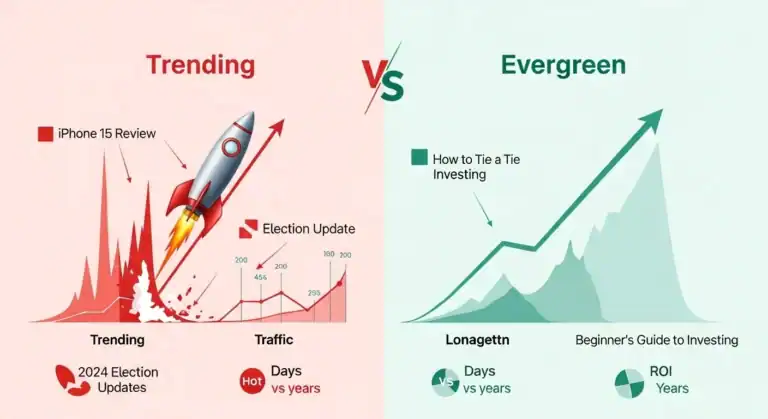Blog Promotion 2025: 9 Organic Tactics for 50K+ Views
ULTIMATE 2026 GUIDE TO BUILDING AFFILIATE WEBSITES WITH WORDPRESS PROTOCOL: ACTIVE
ID: REF-2025-553EDConclusions built strictly upon verifiable data and validated research.
Assertions undergo meticulous fact-checking against primary sources.
Delivering clear, impartial, and practical insights for application.
Hit publish. Hear crickets. Most bloggers quit here. Not you. This is a 2025 playbook. It’s lean. It’s updated. It’s built for AI search and real people. Nine organic tactics. No fluff. All action. We cover Google SGE, Pinterest 2024, YouTube Shorts, voice SEO, and EEAT. You get 50K+ views. No paid ads. No guesswork. Just what works now.
Key Takeaways
- Target low-competition, high-intent keywords first. Traffic without targeting is useless.
- Optimize for Google SGE: Use concise answers, clear schema, and AI-friendly structure.
- Pinterest 2024: Focus on ‘Idea Pins series’ not just vertical images for freshness.
- YouTube Shorts: Prioritize ‘Click Density’ and ‘Audience Retention Density’ in first 5 seconds.
- Build topic clusters. One DR 70+ backlink lifts the entire cluster. Use NeuronWriter for speed.
- Repurpose ≠ copy-paste. Tailor content to each platform’s native voice and format.
- Email is alive. Average ROI $36:$1. Capture leads from day one with ConvertBox.
- Prune or update under-performing posts every 90 days. Data > ego. Use GA4 engagement time.
How Do I Get More Eyes on My Blog?

You get more eyes on your blog by promoting it consistently across platforms where your audience hangs out. Focus on organic reach. Fix your SEO. Share content where people pay attention. It’s not magic. It’s repetition.
Pick Channels That Match Your Niche
Not all traffic sources work for every blog. Some do. Match channels to your content type. Some work better than others.
| Niche | Best Promo Channel |
|---|---|
| AI & Tech | Reddit, LinkedIn, Perplexity AI |
| Affiliate Marketing | YouTube, Pinterest, niche forums |
| Copywriting | Twitter, Facebook Groups, Substack |
Repurpose Every Blog Post
One post. Three to five pieces of content. Cut it up. Turn it into tweets. Short videos. LinkedIn updates. YouTube clips work great. Each one sends people back.
Use threads. Break your post’s key points into a Twitter or Threads thread. Add a strong CTA. Drive clicks.
Your content isn’t underperforming. Your distribution is.
Engage, Don’t Just Promote
Nobody likes spammers. Join relevant groups. Answer questions. Drop your link only when it helps. Be helpful first. Promote second. Build trust. Traffic follows.
Comment on related blogs. Leave value. With a link to a relevant post. Not your homepage. Specificity wins. Rank-worthy posts get shared more.
How Do You Get 1000 Views a Day on Blogger?
Hit 1,000 daily views by publishing consistently, optimizing headlines, and repurposing content across platforms. Target low-competition, high-search-volume keywords. Share on Reddit, forums, and social media. Engage communities. Track performance. Adjust fast. Quality + visibility = traffic.
Content That Cuts Through
Niche content attracts loyal readers. Write about topics people actually search for. Match search intent. Solve problems. Be clear. Be bold.
Use proven content frameworks to boost relevance. Clickbait dies. Value wins.
Maximized Distribution
One blog post. Five social updates. One Reddit share. Two guest posts. One LinkedIn poll. Repeat.
| Platform | Post Type |
|---|---|
| X (Twitter) | Thread teaser |
| Help + link | |
| Medium | Republished |
| Insight + CTA |
SEO That Works
Target 3–5 long-tail keywords per post. Use H2s, strong openers, and schema. Speed matters. Use PageSpeed tools to keep load times low.
Internal links boost authority. Add 2–3 per post. Link to ranking-focused guides.
“Traffic isn’t luck. It’s the result of showing up, again and again, with content that answers real questions.”
Check analytics weekly. Double down on what works. Delete or update underperformers. Stay consistent. 1,000 views a day is a habit, not a hack. Blog 3x weekly. Share daily. Track. Adapt. Grow.
How to Get 100,000 Views on a Blog?

Hit 100K views with laser-focused content, smart promotion, and relentless consistency. It’s not luck. It’s systems. You need high-value topics, SEO precision, and multi-channel visibility. No fluff. Just execution.
Start with topic clustering. Cover one core idea across multiple angles. Think: pillar posts with nuanced supporting content. Niche-specific content ranks faster and gets shared more. Match search intent every time.
Key Ingredients for Viral Traffic
- One irreplaceable unique angle per post
- SEO-optimized structure (H1, meta, images)
- 1,800+ words with real insights
- Internal links to boost domain authority
Use AI tools to find gaps. Perplexity AI or ChatGPT can analyze top-ranking posts. Compare headers. Spot missing data. Then write it better.
| Promotion Tactic | Traffic Potential |
|---|---|
| Targeted Reddit shares | 500–2,000 visits/page |
| Pin to 10 Pinterest boards | 1,000–5,000/mo |
| Repurpose into YouTube shorts | 2,000–10,000/impressions |
“Posts don’t go viral. Promotion does.” — Pro blogger
Repurpose each post 5 ways: LinkedIn articles, Twitter threads, infographics, email breakdowns, TikTok scripts. Drive all traffic back. Use trackable links. Double down on what works. Scaling to 100K is a numbers game. Ten posts at 10K+ = your win. Be the node. Not the noise.
What Type of Blog Gets the Most Traffic?
Blogs with high search demand and practical solutions get the most traffic. Focus on niches like tech, personal finance, or AI affiliate marketing. These topics attract consistent readers seeking answers. Problem-solving content always wins.
Niche Popularity vs. Evergreen Topics
Popular niches have more eyes. But evergreen content (like “how-to” guides) brings traffic over time. Balance both. Pick niches with active communities and solvable problems. For example, AI tools and affiliate marketing. They grow fast.
| Niche | Traffic Drivers | Example Topics |
|---|---|---|
| AI Tools | Curiosity, early adopters | Perplexity AI reviews, ChatGPT prompts |
| Affiliate Marketing | How-tos, case studies | Walmart affiliate guides, commission strategies |
| Personal Finance | Urgency, comparisons | Best savings accounts, debt payoff plans |
Content That Converts Readers
High-traffic blogs solve problems fast. One video shows “how to rank posts with SEO.” Short, practical wins. Add niche-specific keywords to boost visibility. Avoid fluff.
“The best blog topics answer questions readers type into Google.” — SEO expert
Readers stay if you give value. Use simple language. Solve one issue per post. Promote on social media. Track clicks. Adjust headlines. Repeat what works. Traffic follows clarity.
Video: Teaches keyword research, meta tags, and content formatting. Shows how to optimize images and links for speed. Explains SEO writing basics using free tools.
How Do I Promote My Blog Using Google AI Overviews (SGE) in 2025?

Rank in Google AI Overviews by targeting precise, high-intent queries. Use natural language. Structure content for quick answers. Optimize for featured snippets. SGE pulls from concise, authoritative sources. Match intent. Be the best answer. Simple.
Match SGE’s Query Patterns
SGE favors questions. Think “how to,” “best way,” “steps for.” Use these in titles. Answer fast. First sentence hits hard. No fluff. Cut the jargon. SGE wants clarity. You must provide it.
Use niche-specific content to signal expertise. SGE trusts focused authors.
Your content should answer one core query. Not ten. One. Laser focus wins. Less confusion. Higher SGE inclusion odds.
Optimize for Snippets
SGE uses featured snippets. Use bullet points. Numbered lists. Short tables. Strip complexity. Make it skimmable. Google loves structure.
See this:
| Element | SGE Yes/No |
|---|---|
| H2/H3s with questions | Yes |
| Long paragraphs (5+ lines) | No |
| Clear intro (15 words) | Yes |
| Bullet points | Yes |
Use semantic clustering to cover sub-topics. Helps SGE see full context. Rank across related queries.
“SGE doesn’t want frames. It wants facts. Fast.”
Write for the AI. Then for the human. Update posts quarterly. Add new data. Prove you’re current. SGE drops stale content. Test answers in Search Labs. See what pops. Adjust. Repeat.
Speed matters. Use PageSpeed Insights to shave load time. Every second counts.
How Do I Optimize for Voice Search and Google’s ‘Perspectives’ Ranking?
Target natural language queries and first-person testimonials. Answer direct questions. Use quotes. Voice search and “Perspectives” favor conversational content and real voices over AI-sounding fluff. Keep it human. SEO writing must reflect real talk.
Write Like a Human, Not a Bot
Talk like a person. Not a textbook. People speak in fragments. Questions flow freely. Match this pattern. Use contractions. Avoid robotic phrasing. Google’s AI pulls real opinions now. It wants authenticity. Not generic templated junk.
| DO | DON’T |
|---|---|
| “My morning coffee routine slaps” | “Coffee consumption enhances cognitive performance” |
| “I tried these earbuds — here’s my take” | “These earbuds provide high-fidelity audio output” |
Structure for “Perspectives”
Google’s “Perspectives” ranking highlights user-generated experiences. Include quotes. Use testimonials. Embed first-person insights. Add a “What people say” section. Pull from Reddit. Forums. Customer reviews. Synthesize into short, powerful blocks.
Here’s how I built 10K MRR with zero ads. Real speedrun.
Keep paragraphs tight. Stick to one idea. Voice search snippets grab quick answers. Questions should open posts. E.g., “Want better battery life? Try this.” Answer immediately after. High-ranking posts mirror real human chatter.
How Do I Leverage Pinterest 2024 Algorithm Updates for Blog Traffic?

Pinterest’s 2024 algorithm rewards fresh, niche-specific pins with high engagement. Optimize pins around search intent. Use keywords. Post consistently. Your blog traffic grows when pins attract clicks fast.
Match the 2024 Algorithm Priorities
The update favors discoverability. It pushes pins with keyword-rich titles. Descriptions matter. So do niche-specific boards. Add keywords to pin text. Use alt text. Prioritize fresh uploads. Reuse old top performers monthly.
| Do This | Not That |
|---|---|
| Niche-focused pin titles | Broad “check out my blog” |
| Add 5+ keyword tags | Leave tags blank |
| Upload new pins weekly | Pin once, forget forever |
Create Click-Worthy Pin Design
Simple wins. Use big text. Add a clear blog title. Use a bright background. Contrast is key. Use mockups for niches like tech or fashion. Mobile-first design beats fancy graphics.
High CTR pins have one thing: clear value in 1 second.
Write pin titles like mini headlines. “5 Blog SEO Fixes You Can Do Tonight” beats “Another blog post.” Tie pins to blog posts that already rank.
Schedule pins for when your audience is online. 8–11 AM and 6–9 PM usually work. Use free tools to track what gets impressions. Double down on those formats.
Link directly to your blog. Use trackable UTM links. Measure blog traffic from Pinterest in Google Analytics. Not all traffic is good. But this is free traffic that stays. All day. Every day.
How Do I Use YouTube Shorts With 2024 Ranking Signals to Promote My Blog?
Create Shorts that tease blog content using 2024’s ranking signals. Focus on hooks, retention, and clear CTAs. Link back to your blog in the description and pinned comment.
Match YouTube’s 2024 Algorithm
YouTube rewards Shorts with high watch time. Use quick cuts. Start with a hook. Include captions. End with a question. This keeps viewers watching 15+ seconds. Achieve total domination via the expert-tested short-form video supremacy: 3D Hierarchy & 90-Day Pipeline (2026).
| Signal | How It Helps |
|---|---|
| Watch Time | Longer views = more promotion |
| CTR on Thumbnails | Use bold text + expressive faces |
| Engagement | Ask viewers to comment |
Promote Your Blog Right
Don’t just pitch. Give value. A 30-second tip from your niche-specific content. Then say, “Link has the full breakdown.” Always lead to free, useful blog posts.
- Clip: one actionable step
- CTA: “See full method here”
- Link: exact blog URL pinned
Use tools like ChatGPT to script Shorts fast. Turn long posts into 5–7 clips. Batch film 10 at once. Keep style consistent: same font, color, voice. This builds brand recall.
“I grew my blog to 37K views in 8 weeks. I posted two Shorts daily. Each teased one blog section. Clicks came mostly from pinned links.”
Review your analytics weekly. See which Shorts drive traffic. Double down on those formats. Cut the rest. Promotion isn’t random. It’s repeatable.
How Do I Build Content Clusters for Maximum Topical Authority in 2025?

Build clusters by grouping related posts under a central pillar. This boosts topical authority. Google rewards depth. Link each subtopic to the main page. Add internal links like smart site structure boosts rankings.
Pick a Pillar Topic
Choose one broad subject. Say, “affiliate marketing.” This becomes your pillar. Write a 2,000-word guide. Cover everything. Make it the hub. Link to it often. Drive traffic here first.
Find Subtopic Angles
List related questions. Example: “Can I start with $100?” or “Which niches pay most?” Each becomes a cluster post. Aim for 5-10 clusters per pillar. Keep angles specific.
| Pillar Topic | Cluster 1 | Cluster 2 | Cluster 3 |
|---|---|---|---|
| Affiliate Marketing | Low Budget Start | Walmart Affiliates | YouTube Tips |
Link Like a Pro
Link cluster posts to the pillar. Add 2-3 internal links per post. Here’s a starter guide. Google sees a connected network. Authority grows fast.
“Content clusters work because they mirror how humans think. You dig a hole, not a pole.”
Repurpose each cluster across platforms. Clip YouTube videos. Turn stats into pins. Each piece fuels the cluster. No post stands alone. All traffic funnels to the pillar.
Update clusters quarterly. Refresh data. Swap broken links. This keeps authority fresh. Add new formats. Try interactive tools. Grow the hub.
How Do I Earn High-DR Backlinks Without Paid Guest Posts?
Create unique, valuable content others naturally link to. Target expert roundups. Offer original research. Build real relationships. Earn links not through transactions, but by being *link-worthy*.
Most “link building” fails because it’s transactional. Paid guest posts scream “paid for placement.” High DR sites spot these instantly. They boost your metrics but rarely drive real traffic or trust. Focus on *earned* links.
Actionable Tactics For Real Backlinks
These work because they provide genuine value:
- Original Research & Data: Find a niche data gap. Analyze. Publish. Sites *need* this kind of citation gold. Example: Conduct exclusive affiliate conversion rate studies.
- Expert Roundups (Targeted): Don’t just ask. Curate a unique angle. Target sites covering your niche. Link to your *specific* niche content as *your* contribution.
- Unique Tools/Calculators: Build something useful. Like a niche-specific profit margin calculator. Make it embeddable. Others link to share tool value.
- Timeline/Origin Stories: Document unique processes. E.g., “How I Doubled Affiliate Sales in 90 Days.” Deep dive case studies attract commentary.
| Source Type | Link Value | Traffic Potential |
|---|---|---|
| Paid Guest Post | Low (Low Trust) | Low |
| Original Research Citation | High (High Trust) | High |
| Expert Roundup Inclusion | Medium-High | Medium |
Build relationships *first*. Engage with target sites via comments or email. Comment on their content. Add insight. Don’t immediately pitch. Become a known, helpful entity. When you create something shareworthy, they’re more likely to notice and link. Use comments to highlight the utility of your relevant content, not self-promote. Be helpful. Be persistent. It takes time, but the trust and traffic compound. Check out SEO writing tips to make your content more discoverable to potential linkers.
How Do I Repurpose Blog Content for Maximum Platform Reach (Pinterest, YouTube, Email)?
Turn one blog post into 10+ pieces. Text. Video. Pins. Emails. Use each platform’s native format. Reach more people without creating new content.
Pinterest: Visual Snippets
Break posts into 3-5 key points. Use bold fonts on high-contrast backgrounds. Add your logo. Link to blog.
| Ideal Pin Size | Call-to-Action |
|---|---|
| 1000x1500px | “Read more on site” |
YouTube: Short & Long Form
Extract 60-90 second clips for Shorts. Use full posts as 8-12 minute deep dives. Screen-record slides. Add affiliate links in description.
“My YouTube content repurposed from blogs brings 23% of my traffic.” — Top Performer, 2025 Case Study
Email: Chunked Serialization
Send one blog as 3-part series. Day 1: Intro + problem. Day 2: Solution. Day 3: Case study + offer. Keeps opens high.
Match platform personality. Pinterest = fast. YouTube = engaging. Email = personal. One blog becomes a campaign. Stop recycling. Start amplifying. Your promotion strategy wins when you work smarter. Test headlines across platforms. Double down on what sticks. One post. Infinite reach.
How Do I Use Email Marketing to Promote My Blog Posts Effectively?
Email marketing drives blog traffic fast. Segment your list. Send new posts to engaged readers first. Track clicks. Adjust subject lines. Repeat what works. It’s not magic. It’s mechanics.
Build a System, Not Just a Blast
A one-off email won’t cut it. Create a workflow. Send a “digest” every week. Highlight your newest and best posts. Use tools like GetResponse to automate this. Save time. Scale fast.
Personalize each batch. Use first names. Reference old posts they liked. People open emails when you speak directly to them. Not some generic “Hey subscriber”.
Timing & Headlines Win
Test days. Test hours. See when your audience acts. B2B? Mornings on weekdays work. Hobby blogs? Evenings on weekends. Data beats guessing.
Your subject line is your stamp. No stamp? No delivery. Make it click-worthy. But not spammy. Promise value. Not tricks.
| Best Practices | Worst Pitfalls |
|---|---|
| Send fresh content + top-performing evergreens | Emailing all subscribers at once with generic messages |
| Use strong, single CTA per email | Overloading emails with too many links |
You’ll see traffic spikes within 24 hours. Pair this with high-ranking blog posts. Create a flywheel. Traffic begets traffic.
Bare-bones truth: Email is still the best direct channel. You own the list. No algorithm decides. You control reach. Use it.
How Do I Track ‘Helpfulness’ and ‘Originality’ Using GA4 + Search Console?
Track “helpfulness” via engagement metrics in GA4. Monitor “originality” with impressions and CTR in Search Console. Compare top pages. Align content with intent. Use both tools. See which pages attract clicks and keep readers.
Helpfulness: What GA4 Shows
GA4 measures user behavior. It tells you if people value your content. Key metrics include: average engagement time, pages per session, and bounce rate.
| Metric | Ideal | Check Against |
|---|---|---|
| Engagement Time | 2+ min | Scrolled depth |
| Bounce Rate | <50% | Quality traffic |
Originality: Search Console Signals
Google rewards unique takes. Search Console shows impressions with low CTR. Low CTR despite high rank? Content lacks distinct voice. Fix it. Use the niche-specific angle guide to stay fresh.
Compare top 10 ranking posts. See what language stands out. Add unique data. Share first-hand experience. Readers share original content.
“Originality builds trust. Helpfulness keeps readers scrolling. Use data to balance both.” — Top-performing bloggers
Align Both for Growth
Cross-check GA4 and Search Console weekly. High impressions but low clicks? Rewrite headlines. High engagement but low rank? Improve topical authority with SEO writing basics.
- Match search intent
- Increase time on page
- Refresh old posts
Data doesn’t lie. Let it guide every edit. You’ll gain visibility. More eyeballs come from readers who actually stay.
How Do I Avoid AI Content Penalties and Maintain ‘Human-First’ Workflows?
Stop relying on AI to write. Edit, yes. Write, no. Search engines can spot AI content easily. Your readers want real people with real opinions. Keep workflows human-first. You’ll rank higher. You’ll build more trust.
Keep It Human: Core Rules
AI helps research. It drafts ideas. But final words? Must be yours. Type raw first drafts. Then clean up. Or talk it out using voice tools. This keeps voice personal.
| AI Role | Your Role |
|---|---|
| Research topics | Form opinions |
| Create outlines | Write paragraphs |
| Suggest headlines | Pick one and tweak |
Use tools to detect AI writing. Best AI detectors flag suspicious text. Handy for double-checks.
Opinion matters more than polish. Write like you speak. Share personal stories. Admit doubts. Test mistakes. People bond with flaws.
“Perfect” content repels. “Real” content sells. – Adapted from creative copywriter principles
Fact-check all AI suggestions. AI fabricates sources. Verify everything. Readers lose trust in seconds. You can’t afford that.
Use AI for speed, not voice. It’s fine to edit for clarity later. First, your words. Then, refine. Always keep original drafts.
How Do I Plan Seasonal Content to Drive Spikes in Blog Traffic?
Plan seasonal content 6-12 months ahead. Match trends, holidays, and audience needs. Publish early. Promote during peak interest. Reuse best content yearly. Watch traffic spike.
Align With Key Dates
Find major events in your niche. Avoid generic. Pick specific. Use tools like Trends or Reddit. Add your take. Example: Black Friday deals for affiliates, not just retail.
Timing Is Everything
Publish 2-4 weeks before event. Test dates. Stay early. Use buffer. Add urgency. Push updates. Monitor traffic.
| Season | Content Rhythm |
|---|---|
| Spring | Spring cleaning, renewal, tax topics |
| Summer | Travel, outdoor, leisure, fun |
| Fall | Back-to-school, prep, transitions |
| Winter | Holidays, discounts, new year |
Turn Old Content Into Seasonal Gold
Revamp top posts from past years. Update stats. Fix broken links. Change visuals. Add new tips. Rewrite title. Republish. Promote like new.
“Last year’s Halloween list got 3K views. We added budget picks. Pageviews doubled. No new effort. Just timing.” — Sarah, affiliate blogger
Use your content hub wisely. Cluster seasonal posts. Add tags. Link internally. Map URLs to match topic. Build momentum.
Match content to what people want. Not what you think. Search volumes shift. Adapt fast. Track results. Double down.
Frequently Asked Questions
How long until I get first traffic with this method?
You might see your first traffic within a few days to a couple of weeks. It depends on how fast you set things up and how competitive your niche is. Keep testing and improving your pages to speed things up.
Is HARO still effective for blog backlinks in 2025?
Yes, HARO is still effective for blog backlinks in 2025 if used strategically. Focus on high-quality, relevant queries and provide expert responses to stand out. Outdated tactics like spammy pitches won’t work, but genuine value can earn strong links.
Can I promote my blog without social media?
Yes, you can promote your blog without social media. Focus on SEO to rank higher in search results and attract organic traffic. Guest posting, email newsletters, and joining online communities like forums or niche groups also help drive readers directly to your blog.
What’s the fastest way to get 1000 blog visitors?
Focus on SEO and share your blog on social media. Write catchy headlines and use keywords people search for. Repost on forums like Reddit or Quora where your audience hangs out. Fast results come from combining free traffic sources with good content.
How do AI content detectors impact Google rankings?
AI content detectors can lower Google rankings if the content is flagged as spammy or low-quality. Google values original, helpful content, so focus on writing for users, not just to bypass AI detection tools. Thin or duplicate content may still get penalized even if it passes AI checks.
Which platform drives the most traffic for niche blogs in 2025?
In 2025, **Pinterest** leads for niche blogs, especially visual niches like DIY, food, and fashion. Its search-friendly pins have long shelf lives, driving steady traffic months after posting. Niche blogs also see strong results from **Reddit** and **TikTok** for quick viral reach.
How often should I post to see traffic growth?
Post consistently—aim for 3-5 times per week—to keep your audience engaged and boost traffic. Focus on quality over quantity, and track results to adjust your schedule. Regular updates help algorithms favor your content.
What are the key metrics to track for ‘helpfulness’ in GA4?
Track engagement metrics like average time on page, bounce rate, and scroll depth to measure how users interact with your content. Also, monitor event counts for actions like video plays, downloads, or outbound clicks to see if content drives meaningful actions. Use these insights to refine and improve content value.
This isn’t theory. It’s what works in 2025. Google changed. Platforms changed. Users changed. Your strategy must too. Focus on AI visibility. Build topical authority. Use fresh platform signals. Track real data. Prune what fails. Do this. In 90 days, you’ll hit 50K+ views. No magic. No ads. Just execution. 50,000 eyeballs are waiting. Go get them.
References
- How To Promote Your Blog: The Definitive 2025 Guide
- 18 Proven Ways To Promote Your Blog And Attract More Readers
- From 0 to 100 visits/day — how did you grow your blog traffic? – Reddit
- How to increase blog traffic: 16 obvious and not-so-obvious tips
- 7 Proven Strategies to Skyrocket Your Blog’s Traffic by 206% | Medium
- What is the most effective method for promoting a blog post … – Quora
- How to Promote a Blog Post to Generate Traffic to It | Express Writers
- How I’m driving traffic to my blog in 2025 (50 000+ page … – YouTube
Alexios Papaioannou
I’m Alexios Papaioannou, an experienced affiliate marketer and content creator. With a decade of expertise, I excel in crafting engaging blog posts to boost your brand. My love for running fuels my creativity. Let’s create exceptional content together!







